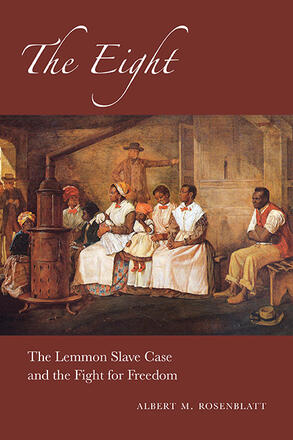
The Eight
The Lemmon Slave Case and the Fight for Freedom
Alternative formats available from:
The personal and legal struggle of eight enslaved people for freedom in New York in the period just before the Civil War.
Description
Finalist for the 2023 Foreword INDIES Book of the Year Award in the History category
The Eight tells the story of Lemmon v. New York—or, as it's more popularly known, the Lemmon Slave Case. All but forgotten today, it was one of the most momentous civil rights cases in American history. There had been cases in which the enslaved had won their freedom after having resided in free states, but the Lemmon case was unique, posing the question of whether an enslaved person can win freedom by merely setting foot on New York soil—when brought there in the keep of an "owner." The case concerned the fates of eight enslaved people from Virginia, brought through New York in 1852 by their owners, Juliet and Jonathan Lemmon. The Eight were in court seeking, legally, to become people—to change their status under law from objects into human beings. The Eight encountered Louis Napoleon, the son of a slave, an abolitionist activist, and a "conductor" of the Underground Railroad, who took enormous risks to help others. He was part of an anti-slavery movement in which African-Americans played an integral role in the fight for freedom. The case was part of the broader judicial landscape at the time: If a law was morally repugnant but enshrined in the Constitution, what was the duty of the judge? Should there be, as some people advocated, a "higher law" that transcends the written law? These questions were at the heart of the Lemmon case. They were difficult and important ones in the 1850s—and, more than a century and a half later, we must still grapple with them today.
Albert M. Rosenblatt teaches at the New York University School of Law and is a retired Judge of New York State Court of Appeals. His previous books include Opening Statements: Law, Jurisprudence, and the Legacy of Dutch New York (coedited with Julia C. Rosenblatt) and Judith S. Kaye in Her Own Words: Reflections on Life and the Law, with Selected Judicial Opinions and Articles (coedited with Judith S. Kaye and Henry M. Greenberg), both published by SUNY Press.
Reviews
"…a human, humanizing, and timely work." — Hudson River Valley Review
"In his lucid book, unencumbered by legalese, Rosenblatt narrates how, upon reaching New York, abolitionists, Black and white, assisted the eight enslaved people in suing for their freedom. An 1841 New York law granted liberty to any enslaved person brought into the state. Rosenblatt painstakingly charts the successful freedom suit in New York City's Superior Court and ultimately its victory in the New York Court of Appeals." — CHOICE
"The Lemmon affair of the 1850s was New York's Dred Scott case. Raising the question whether eight Black people on a vessel in New York harbor were enslaved or free, the eight-year litigation put the American legal system on a collision course with Civil War. Albert Rosenblatt's lucid and revelatory account of the case brilliantly shows how it threatened to turn every state in the Union into a slave state. Unearthing previously unknown documents, The Eight is the definitive story of this courageous fight—one that is as complete as it is compelling. Historians and lawyers will rely on the book for years to come." — John Fabian Witt, author of Lincoln's Code: The Laws of War in American History
"Albert Rosenblatt's extensive research of the Lemmon Slave Case provides a rare glimpse into the circumstances surrounding the emancipation of eight enslaved individuals. Thanks to Rosenblatt, this history has been brought to life and made more accessible through this thought-provoking book." — Luanne Wills-Merrell, descendant of two of the eight